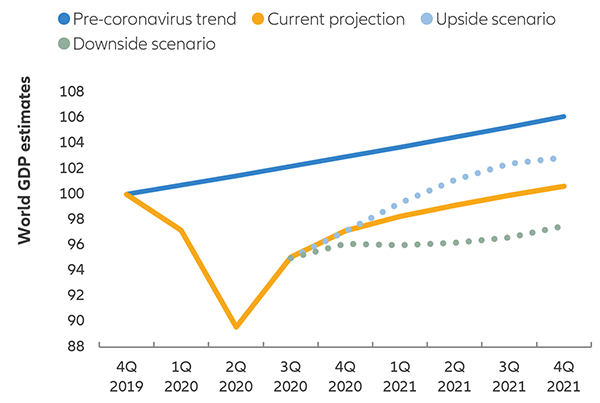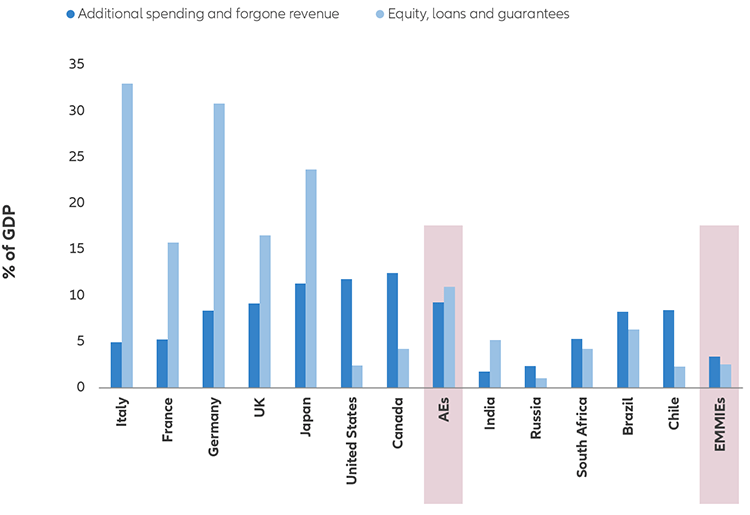Active is: Anticipating what’s ahead
2021 outlook: portfolios need a broader mix as the pandemic prolongs the uncertainty

Summary
While investors can approach 2021 with optimism that an effective Covid-19 vaccine will be available, the path of the economic recovery remains unclear. A broader toolkit of investments is needed – not just the regions, sectors and strategies that have recently done well.
Active is: Challenging convention
Brexit done, Covid continues: what’s next for the UK?

Summary
The UK market has been deeply out of favour for some time now. The agreement of a UK-EU trade deal marks an essential step towards making the UK “investable” again but several other factors – not least the ongoing Covid-19 pandemic – will continue to weigh on sentiment.
Key takeaways
|
Explore our view on what 2021 has in store
While investors can approach 2021 with optimism that an effective Covid-19 vaccine will be available, the path of the economic recovery remains unclear. A broader toolkit of investments is needed – not just the regions, sectors and strategies that have recently done well.
-
The MSCI World Index is an unmanaged index considered representative of stocks of developed countries. The MSCI All Country World Index (ACWI) is an unmanaged index designed to represent performance of large- and mid-cap stocks across 23 developed and 24 emerging markets. The MSCI Europe Index is an unmanaged index that measures the performance of the equity market of the developed markets in Europe. The MSCI Japan Index is an unmanaged index that measures the performance of the equity market of Japan. The Standard & Poor’s 500 Composite Index (S&P 500) is an unmanaged index that is generally representative of the US stock market. Investors cannot invest directly in an index.
Investing involves risk. The value of an investment and the income from it will fluctuate and investors may not get back the principal invested. Equities have tended to be volatile, and do not offer a fixed rate of return. Investing in the bond market is subject to risks, including market, interest rate, issuer, credit, inflation risk, and liquidity risk. The value of most bonds and bond strategies are impacted by changes in interest rates. Bond prices will normally decline as interest rates rise. The impact may be greater with longer-duration bonds. Credit risk reflects the issuer’s ability to make timely payments of interest or principal—the lower the rating, the higher the risk of default. Emerging markets may be more volatile, less liquid, less transparent, and subject to less oversight, and values may fluctuate with currency exchange rates. Investments in alternative assets presents the opportunity for significant losses including losses which exceed the initial amount invested. Some investments in alternative assets have experienced periods of extreme volatility and in general, are not suitable for all investors. Environmental, Social and Governance (ESG) strategies consider factors beyond traditional financial information to select securities or eliminate exposure which could result in relative investment performance deviating from other strategies or broad market benchmarks. Past performance is not indicative of future performance. This is a marketing communication. It is for informational purposes only. This document does not constitute investment advice or a recommendation to buy, sell or hold any security and shall not be deemed an offer to sell or a solicitation of an offer to buy any security.
The views and opinions expressed herein, which are subject to change without notice, are those of the issuer or its affiliated companies at the time of publication. Certain data used are derived from various sources believed to be reliable, but the accuracy or completeness of the data is not guaranteed and no liability is assumed for any direct or consequential losses arising from their use. The duplication, publication, extraction or transmission of the contents, irrespective of the form, is not permitted.
This material has not been reviewed by any regulatory authorities. In mainland China, it is used only as supporting material to the offshore investment products offered by commercial banks under the Qualified Domestic Institutional Investors scheme pursuant to applicable rules and regulations. This document does not constitute a public offer by virtue of Act Number 26.831 of the Argentine Republic and General Resolution No. 622/2013 of the NSC. This communication's sole purpose is to inform and does not under any circumstance constitute promotion or publicity of Allianz Global Investors products and/or services in Colombia or to Colombian residents pursuant to part 4 of Decree 2555 of 2010. This communication does not in any way aim to directly or indirectly initiate the purchase of a product or the provision of a service offered by Allianz Global Investors. Via reception of his document, each resident in Colombia acknowledges and accepts to have contacted Allianz Global Investors via their own initiative and that the communication under no circumstances does not arise from any promotional or marketing activities carried out by Allianz Global Investors. Colombian residents accept that accessing any type of social network page of Allianz Global Investors is done under their own responsibility and initiative and are aware that they may access specific information on the products and services of Allianz Global Investors. This communication is strictly private and confidential and may not be reproduced. This communication does not constitute a public offer of securities in Colombia pursuant to the public offer regulation set forth in Decree 2555 of 2010. This communication and the information provided herein should not be considered a solicitation or an offer by Allianz Global Investors or its affiliates to provide any financial products in Brazil, Panama, Peru, and Uruguay. In Australia, this material is presented by Allianz Global Investors Asia Pacific Limited (“AllianzGI AP”) and is intended for the use of investment consultants and other institutional/professional investors only, and is not directed to the public or individual retail investors. AllianzGI AP is not licensed to provide financial services to retail clients in Australia. AllianzGI AP (Australian Registered Body Number 160 464 200) is exempt from the requirement to hold an Australian Foreign Financial Service License under the Corporations Act 2001 (Cth) pursuant to ASIC Class Order (CO 03/1103) with respect to the provision of financial services to wholesale clients only. AllianzGI AP is licensed and regulated by Hong Kong Securities and Futures Commission under Hong Kong laws, which differ from Australian laws.
This document is being distributed by the following Allianz Global Investors companies: Allianz Global Investors U.S. LLC, an investment adviser registered with the U.S. Securities and Exchange Commission; Allianz Global Investors Distributors LLC, distributor registered with FINRA, is affiliated with Allianz Global Investors U.S. LLC; Allianz Global Investors GmbH, an investment company in Germany, authorized by the German Bundesanstalt für Finanzdienstleistungsaufsicht (BaFin); Allianz Global Investors (Schweiz) AG; Allianz Global Investors Asia Pacific Ltd., licensed by the Hong Kong Securities and Futures Commission; Allianz Global Investors Singapore Ltd., regulated by the Monetary Authority of Singapore [Company Registration No. 199907169Z]; Allianz Global Investors Japan Co., Ltd., registered in Japan as a Financial Instruments Business Operator [Registered No. The Director of Kanto Local Finance Bureau (Financial Instruments Business Operator), No. 424, Member of Japan Investment Advisers Association and Investment Trust Association, Japan]; and Allianz Global Investors Taiwan Ltd., licensed by Financial Supervisory Commission in Taiwan.












Financial repression “reloaded” and massive government debt could drive up long-term yields
Given the support that central banks pledged in the face of Covid-19, we expect short-term interest rates to remain at ultra-low levels for the foreseeable future. This is essentially a “reloading” of the financial-repression policies (including low interest rates, restricted capital flows and other regulations) that central banks implemented after the financial crisis to help their economies grow their way out of debt. In our view, continued intervention by central banks is necessary, but it could still lead to higher inflation and other problems in the medium to longer term. In addition, a huge supply of sovereign bonds – the direct consequence of extremely expansionary fiscal policy – will continue to flood the bond markets in the coming quarters.
What does it mean for investors?
Equities could benefit from positive news about the coronavirus – but balance and selection are key
Amid the upheaval of the Covid-19 pandemic and accompanying lockdowns, certain regions and asset classes did quite well – particularly US large-cap technology and online retail names that benefited from the “stay-at-home” trend. Positive developments in the fight against the coronavirus could help a broader range of stocks and regions in addition to these “coronavirus winners”.
One such positive development was the announcement of promising vaccine trials towards the end of 2020. Yet it remains unclear how long it will take to roll out these vaccines and how many people will be willing to get them. Until then, many regions will likely grapple with subsequent waves of coronavirus infections. So as we wait for effective vaccines and therapeutic treatments to be broadly adopted, the growth outlook will be unclear and private-sector spending (including private consumption and investments) could be suppressed.
If cyclical economic data lose momentum, equities could suffer – particularly if the markets see a disconnect between asset prices and the underlying health of the economy.
What does it mean for investors?
Exhibit 3: the value investing style is at an extreme discount to growth
Relative valuation of MSCI World Value/Growth (1985-2020)
Source: Refinitiv Datastream, Allianz Global Investors. Data as at October 2020.
The US dollar seems more likely to weaken, which would benefit non-US markets
As the global economic rebound ramped up, the US dollar fell in value relative to other currencies (see Exhibit 4). While some economists see a turnaround on the horizon – in large part because uncertainty about Covid-19 is supportive for “safe-haven” assets such as the US dollar – we are slightly more inclined to believe the dollar will fall for several reasons:
What does it mean for investors?
Exhibit 4: the US dollar dropped in 2020 as the global economy recovered
US dollar trade-weighted index (2015-2020)
Source: Bloomberg, Allianz Global Investors. Data as at October 2020.
Sustainable investing provides the long-term view investors need
The coronavirus pandemic exposed shared vulnerabilities in the global economy and the systems on which we all rely. Investors will increasingly need to find ways to be selective among sectors and individual names, rather than rely on broad market performance. Environmental, social and governance (ESG) factors can be a helpful lens for highlighting major global risks and testing the resilience of businesses and systems.
The Covid-19 pandemic also forced many investors to hit the “reset” button and recalibrate their priorities, with policymakers, regulators and investors examining the social effects of economic activity. A growing number of investors will want to put their capital to work in a sustainable way, and they’ll be looking for creative ideas to help achieve meaningful real-life change on topics such as climate change.
This may happen within the framework of the 17 UN Sustainable Development Goals (SDGs), which call for greater cooperation between countries, organisations, companies and individuals to address vital development issues. A 2017 UN report put the SDG funding gap in developing countries at around USD 2.5 trillion per year, making it critical to find innovative and scalable new investment products for the countries and sectors most deprived of funding. This can take the form of public/private partnerships, with parties with similar goals shouldering different responsibilities. The field of development finance – which uses capital and know-how from public and philanthropic sources to mobilise private investment into sustainable development – can play a crucial role here.
For example, given that massive spending is still needed to return parts of the economy to its pre-pandemic growth trajectory, some governments see an opportunity to rejuvenate existing infrastructure such as electricity networks. This can be done while building the social, environmental and clean-energy projects that will support the well-being and prosperity of future generations.
But sustainable investing is not just about doing good – it also helps investors seek solid performance. As Exhibit 5 shows, approximately two-thirds of active ESG managers in the eVestment database (which tracks institutional asset managers) have beaten the benchmark index for global equities during the last three years. This includes 2020 – an extremely volatile period for equities.
Exhibit 5: the majority of active global ESG managers have beaten the benchmark global equity index over the last 3 years
Percentage of active managers in eVestment Global Equity ESG database that outperformed the MSCI All Country World Index (through 3Q 2020)
Source: eVestment. Data as at September 2020. The bars represent the % of active managers in the eVestment Global ESG database outperforming the MSCI ACWI Index in each period.
What does it mean for investors?
There are many options for investors who want to put their money to work in a sustainable way – particularly as the world recovers from the Covid-19 pandemic.